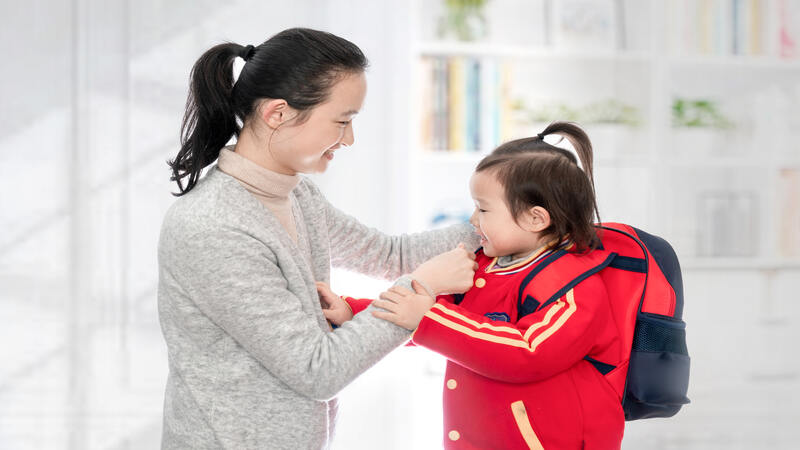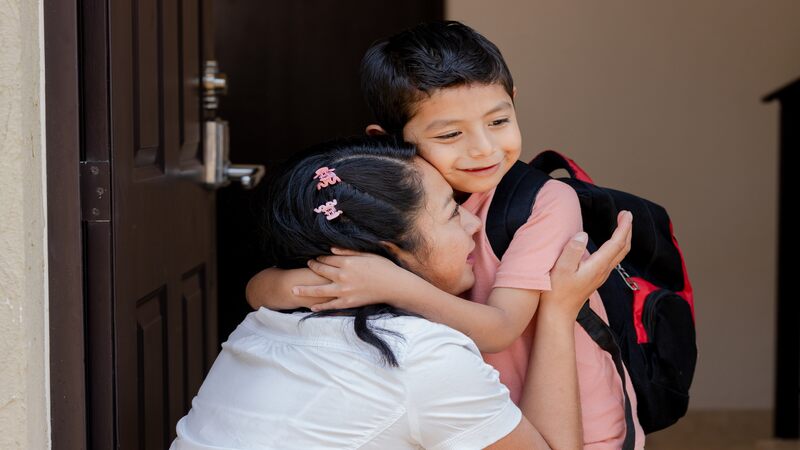
Congratulations! Your toddler is finally big enough to be sent to preschool. As you prepare to put toddlers in a preschool, your biggest worry is how they will adjust. You do not want them to cry their heart out every day, so even before school starts, you start the preschool preparations.
You start preschool preparations by telling them how exciting the school will be, how they will make new friends, how they will get to play with new toys, and how they will be back home soon so there is no reason to worry or cry. However, what you do not prepare them for—and this is what mostly worries the kids apart from the anxiety of being away from you—is how their schedule changes in the preschool.
Why is a Routine Important for a Toddler?

Every toddler is a stickler for routine. The consistency that comes with a set routine makes the kid happy and secure (1). You would have already experienced crankiness when your little one misses an afternoon nap, for instance.
When toddlers know what to expect and what not to expect at different times of the day, it makes them more grounded and disciplined as there are few unknowns in their day (2). When they know what is coming next, they will not be cranky and will tune in accordingly. The predictable pattern of their day also helps instill trust between them and the adults around them.
How Does My Child’s Schedule Change After Playschool?

When your kids start preschool, they are effectively forced to change the routine they have been used to. Imagine this—they are cranky when they miss a nap at home. In preschool, they will be asked to nap at a different time, and as if that is not enough, they will be in a new place, away from home, away from mommy, and surrounded by friendly but strange faces.
Anxiety and insecurity enter the scene very quickly and it all translates into “I don’t want to go to school!” and other wails every day. Furthermore, just as consistency in routine helps them trust their caregiver, they feel threatened by adults who disrupt their schedule, such as preschool teachers, which is undesirable.
Do not worry; this is not a lost cause. Understanding how your child’s schedule changes and practicing some preschool preparations can help to alleviate his anxiety.
What Are The Major Routine Changes For a Pre-Schooler?

When your toddler starts preschool, the following are the major schedule changes that can happen:
1. Wake Up Time
Depending on when your kid needs to leave for school, their morning routine changes greatly. If your toddler is an early riser, it is half the battle won. But if not, then they might have to wake up earlier than they are used to and this can lead to protests.
2. Meal Time
At home, your kid is usually fed on demand. They probably watch TV while eating. Or you tell them a story when feeding them. Whatever the case, preschool might have a different snack and main meal time.
3. Potty Time
Well, toddlers go to the potty when they need to, wherever they are. However, some kids – especially the potty-trained ones – are not comfortable doing potty in school, where they know they will not be cleaned by someone they are used to. By holding back potty, they become irritable and uncomfortable, which leads to crankiness.
4. Nap Time
Your toddler might be used to a later afternoon nap. Or if they are an early riser, he might doze off by 12 noon. All this would change in preschool. Most preschools have set nap time, usually after lunch by 1. When your kid doesn’t get to sleep at a time they are used to and is forced to sleep on a floor mattress with other kids, it can raise their anxiety levels very high.
5. Play Time
Kids are used to playing whenever they want wherever they want. This will change in preschool, where there are set “play-times” and set “sit-down-times”.
6. Activity Time
Most parents do not differentiate between play and activity time when at home. However, activity times refer to a period when toddlers engage themselves in some activity to learn a new skill (3). The key thing here is that the time is structured and your kid is expected to sit through it without getting distracted.
How to Prepare a Child For The New Routine in Preschool?

One of the most effective ways to start preschool preparations for toddlers is to understand how their new routine will be and slowly transition them to the routine at home.
Here are some tips for evolving your kid’s schedule:
1. Take the Cues From the School
Talk to the preschool teachers early on and understand from them what their class schedule looks like. Understand what kind of meals would be fed at what time; figure out the time when they would be playing, when they would be sleeping and when they would be doing various learning activities. This is your battle plan! Once you have it, you can start thinking about making changes at home.
2. Start the Transition as Early as Possible
Once you are equipped with the information on the preschool schedule, start modifying your toddler’s day. Ideally, you will have about 2 months after admission before the school reopens. But some of us make up our minds about preschool a bit later, so we get less time. This is ok as long as you understand what needs to be done.
3. Nap Routines
Do not change everything all at once. Start with nap timings. Encourage them to sleep early, so that they wake up earlier than usual. This would mean they are ready for their noon nap sooner. In a week or two, your kid will adapt to the new nap routine.
4. Make Changes to the Meal
If you are worried your kid might not snack well in school, think about starting the day with a heavy meal at home. Change your toddler’s meal timings in accordance with the schedule the teacher gave you. Also, enquire about the kind of snacks and meals given in the school (if the school provides the food). Try to incorporate the same food items in your daily diet so that your kid gets used to the food.
5. Bind Your Child
Encourage your toddler to sit and perform any activity for a fixed time during the day. Again, start small. Start with a 10-minute activity like tearing paper or painting. Slowly increase time.
6. Together, to the School
Ensure you visit the school with them multiple times so that they know they can trust the place and the people there and not worry about things like potty and peeing in school.
Naps and meals are the two most important items in the daily schedule, so get these two right before you move on to play and activity times.
Will Preschool Change Mother’s Life Too?

Whether you are a stay-at-home mom or a working mom, preschool would change your life too! If you are a SAHM, congratulations—you now get at least 2-3 hours to finish your household chores. If you are a working mom, congratulations—you also get a few more productive hours when you know your kid is well taken care of. That said, your daily schedule is also bound to change.
For instance,
- If your kid’s school does not provide meals, you might have to wake up earlier to prepare snacks and lunch boxes for them.
- If your toddler’s school does not provide transport options, you need to change your work (office or home) timings to pick your kid up.
- If you are starting work after a break and have no support system at home, you have to make alternate arrangements for days when your kid does not go to school.
Even after all these preschool preparations, toddlers might still cry when they go to preschool, mind you. However, they wouldn’t be crying because they are not getting their meals or naps on time! Establishing a routine helps them transition to school faster as they are mentally more prepared for what to expect during the day. And that is progress!
FAQs
1. Why Are Routines Important in Preschool?
Following a routine is very important when you prepare your toddler for a preschool entry. This will make your toddler feel more familiar when they finally start their preschool. Timely napping and eating following a consistent daily routine makes them feel more confident and in control.
2. How Does a Routine Positively Impact a Child’s Brain Development?
Following a consistent routine improves neural connections. Following a regularity in everyday tasks signals their brain that everything is stable, safe, and normal. Routine helps them remember the order in which their daily tasks occur. It gives them more confidence, as they know what to expect in a situation.
3. How to Explain Daily Routines for Kids?
You do not actually have to explain to your toddler what routine is. You will just have to make them practice their daily tasks one by one and it will become their routine. Tell them it is in their routine to brush after waking up or have their lunch after bath. Gradually, they have their own understanding of the term “routine.”
4. How Can a Change in Routine Affect a Child?
Maintaining a consistent routine is essential for a child’s mental and emotional stability, as well as their sense of security. Sudden changes to their daily routine can lead to feelings of worry and anxiety. These abrupt shifts may also result in behavioral changes or a complete regression to previous habits. To help your toddler adapt, it’s important to make changes gradually, allowing them time to adjust.
References
- Lixin Ren, Courtney Boise, Rebecca Y.M. Cheung, Consistent routines matter: Child routines mediated the association between interparental functioning and school readiness, Early Childhood Research Quarterly, Volume 61, 2022, Pages 145-157 – https://www.sciencedirect.com/science/article/pii/S0885200622000631
- Effective discipline for children. Paediatr Child Health. 2004 Jan;9(1):37-50 – https://www.ncbi.nlm.nih.gov/pmc/articles/PMC2719514/
- Sutapa P, Pratama KW, Rosly MM, Ali SKS, Karakauki M. Improving Motor Skills in Early Childhood through Goal-Oriented Play Activity. Children (Basel). 2021 Nov 2;8(11):994. – https://www.ncbi.nlm.nih.gov/pmc/articles/PMC8625902/

1 Comment
Very usefull piece of information. I totally agree to this and insist every parent to go through this article